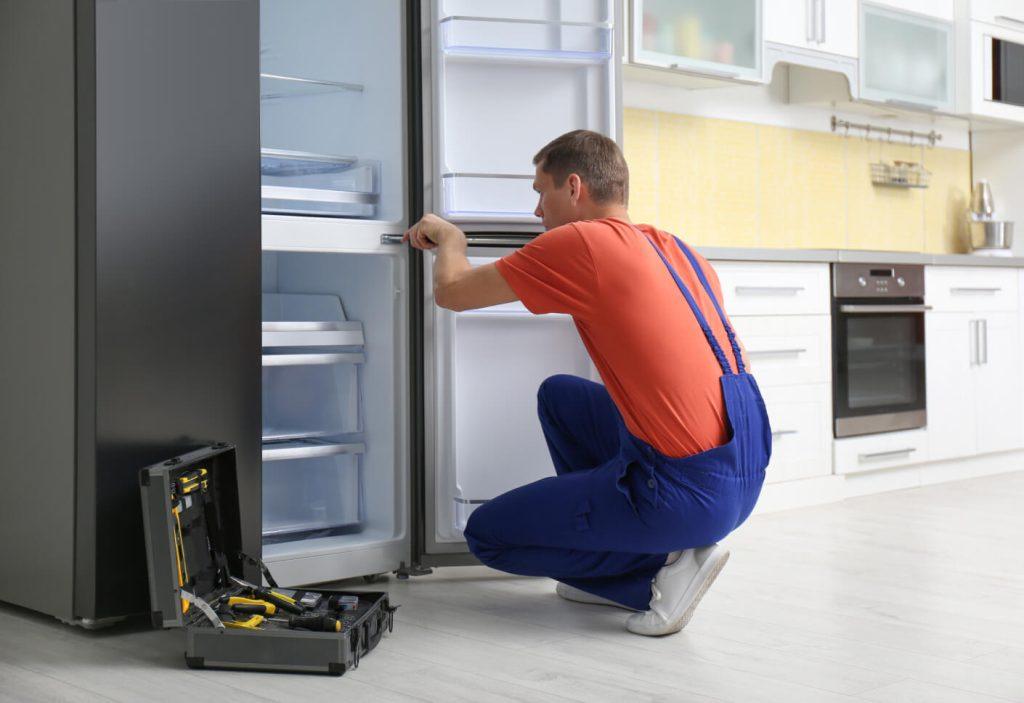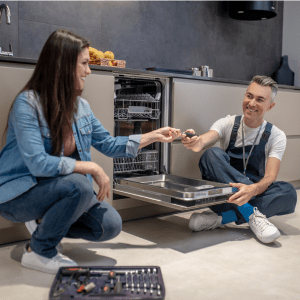
It not only causes a problem, but it may also harm your kitchen floor and impair the efficiency of your equipment. However, fixing the leaking refrigerator is easier than it may seem. In this post, we will outline the procedures for locating the damage’s origin and resolving the issue. So, roll up your sleeves, and let’s get started on fixing that annoying leak. If the problem persists, you can call an expert from Repair Fast.
Outline
- Identifying the Source of the Leak
- Check the Water Supply Line
- Inspect the Water Filter
- Examine the Drain Pan
- Assess the Defrost Drain
- Fixing Common Refrigerator Leaks
- Fixing a Leaking Water Supply Line
- Replacing a Faulty Water Filter
- Cleaning the Drain Pan
- Clearing the Defrost Drain
- Repairing Refrigerator Door Gasket Leaks
- Resolving Ice Maker Leaks
- Handling Freezer Drain Clogs
- Fixing Refrigerator Leaks Caused by a Blocked Defrost Drain
- Preventative Maintenance Tips
- Calling a Professional Technician
Identifying the Source of the Leak
Before jumping into repairs, it’s crucial to identify the source of the leak. Different areas of the refrigerator can be responsible for the leakage. By narrowing down the problem, you can apply the appropriate fix.
Check the Water Supply Line
Inspect the water supply line that connects to the back of your refrigerator. Look for any visible cracks or loose connections. Tighten connections or replace the supply line if necessary.
Inspect the Water Filter
Some refrigerators have built-in water filters. If the filter is old or damaged, it may cause leaks. Replace the water filter following the manufacturer’s instructions.
Examine the Drain Pan
An overflow container is at the bottom of the refrigerator to collect any lakes that may form. If the floor is damaged or misaligned, water may leak into it. Adjust or replace the drain pan as needed.
Assess the Defrost Drain
A clogged defrost drain can lead to water accumulation and leakage. Clean the defrost drain using a mixture of warm water and mild detergent.
Fixing Common Refrigerator Leaks
Let’s dive into the specific solutions for common refrigerator leaks:
- Repairing a Leaking Water Supply Line
- Turn off the water supply and unplug the refrigerator.
- Check the supply line for any damage and replace it if necessary.
- Reconnect the supply line and turn on the water to test for leaks.
- Replacing a Faulty Water Filter
- Follow the manufacturer’s instructions to remove the old water filter.
- Install the new filter securely and run water through it to ensure proper functioning.
- Cleaning the Drain Pan
- Carefully remove the drain pan and clean it thoroughly.
- Ensure it is positioned correctly before putting it back in place.
- Clearing the Defrost Drain
- Access the defrost drain at the back of the freezer.
- Gently clear any obstructions using a soft brush or warm water.
Repairing Refrigerator Door Gasket Leaks
If you notice water pooling around the refrigerator door, the door gasket might be faulty. Remember to inspect the rubber seal that lines the door when checking your fridge. This seal, the door gasket, is responsible for creating a tight seal that keeps the air inside. Look for any tears or gaps in the gasket and replace it if necessary.
Resolving Ice Maker Leaks
Leaking water around the ice maker can be attributed to a faulty water inlet valve or an issue with the ice maker assembly. Inspect the valve and replace it if it’s damaged. If the ice maker assembly is defective, consider replacing it following the manufacturer’s guidelines or calling Repair Fast for a quick fix.
Handling Freezer Drain Clogs
A clogged freezer drain can lead to water backing up and leaking out of the freezer. To address this issue, turn off the refrigerator, locate the drain, and carefully remove debris or ice buildup.
Fixing Refrigerator Leaks Caused by a Blocked Defrost Drain
A blocked defrost drain can cause water to accumulate inside the refrigerator and eventually lead to leakage. To fix this, identify the drain location and use warm water to flush out any blockages. If the issue is severe, you need to call a mechanic.
Preventative Maintenance Tips
- Prevention is always better than cure when it comes to appliance leaks. Follow these tips and tricks to minimize the chances of a leaking refrigerator:
- Regularly inspect and clean the drain pan and defrost the drain.
- Replace the water filter at the recommended intervals.
- Keep the refrigerator door gasket clean and free from debris.
- Check the water supply line for any signs of wear and tear.
- Calling a Professional Technician
Suppose you have tried the solutions above, and the leak persists. In that case, it might be time to call a professional refrigerator technician. They have the expertise to diagnose and fix complex issues, ensuring your refrigerator works optimally.
Conclusion
The repair of a broken refrigerator can be simple. By identifying the source of the damage and implementing the proper fixes, the problem can be resolved and further damage prevented. Regular maintenance and prompt repair suggestions from repairfast.co will help keep your refrigerator in top-notch condition, ensuring its longevity and efficient performance.
FAQs
Q: Can a leaking refrigerator cause damage to my kitchen floor?
A: If left unaddressed, a leaking refrigerator can damage your kitchen floor and even lead to mold growth.
Q: How often should I replace the water filter in my refrigerator?
A: Water filters should typically be replaced every six months, per the manufacturer’s guidelines.
Q: Can I use any replacement parts for my refrigerator?
A: It is best to use genuine replacement parts recommended by the manufacturer to ensure compatibility and proper functioning.
Q: Why is it essential to clean the drain pan regularly?
A: Cleaning the drain pan prevents water from overflowing and causing leakage.
Q: Is it necessary to turn off the water supply when fixing a water supply line leak?
A: Turning off the water supply is essential to avoid water spillage and accidents during the repair process.




